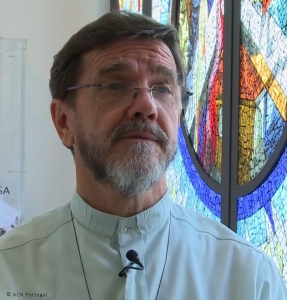Attacks in northern Mozambique have already caused more than 500 deaths and thousands of displaced people since October 2017. Speaking to Aid to the Church in Need, Bishop of Pemba, Msgr Luiz Fernando Lisboa speaks of the jihadist threat, the inability of the security forces to contain this wave of violence and the help that ACN has given to its diocese, one of the poorest in one of the poorest countries in the world.
The wave of violence that has affected northern Mozambique does not seem to have an end in sight. Last week, between the 29th and 30th of January, there were at least six attacks in the province of Cabo Delgado that caused a general stampede of the populations and a huge trail of destruction in villages located in the administrative posts of Bilibiza and Mahate, both belonging to the Quissanga district, located about 120 kilometers from the city of Pemba.
For Bishop Luiz Fernando Lisboa, Bishop of Pemba, these attacks “are a tragedy”.
Several villages were destroyed, with houses and infrastructure on fire, including public services and a health center. “I heard that the school was burned, and then they destroyed other commercial houses [located] nearby,” described the prelate.
“There is no official statistic of the number of people who lost their lives since, in late 2017, very violent attacks against villages, administrative and military posts began to break out, with the record of several people beheaded in a display of terror that is leaving the population deeply apprehensive.”, he said.
For Bishop Luiz Fernando Lisboa, the death toll is around half a thousand. “We do not have an exact number, but I certainly believe that there are more than 500 people who have already lost their lives. If it were one person it would be a lot”.
This situation, which the Bishop classifies as “a tragedy”, is having direct repercussions on the daily lives of the people. “The villages are becoming empty, people are not planting, so that means there will be famine, and we have thousands of internally displaced people”, explains the prelate, advancing with a forecast well above the figures advanced so far by official entities, namely the United Nations.
In fact, according to the UN, there will be about 60,000 displaced people in the northern region of Mozambique as a result of the attacks on villages.
Bishop Fernando recalls that, in the beginning, in October 2017, when the first attacks happened, there was a clear distance and rejection by those responsible for the local Muslim community. “When the attacks started, and it was said that it was a radical Islamic group, the Muslims themselves distanced themselves and said that they did not belong to the community: ‘They are not ours, they are bandits …’, so to speak. But we are very worried and sad when they now start to claim [the attacks] saying that it is this radical Islamic group. ”The intensification of the attacks could also mean a threat to regional security, with signs already showing that in neighboring Tanzania the authorities will already be on alert.
In fact, Tanzania is considered by experts on terrorism issues as a refuge and recruitment camp for extremist militants who move easily across borders between the two countries.
This reality is, in the words of the Bishop of Pemba, “very worrying”. “Whether there is an international or transnational network is more worrying because they are strong and this is much more difficult to overcome, to end it.”
The real size of the terrorist groups operating in northern Mozambique is unknown. The Christian community feels threatened and the Bishop himself says that he is aware that he may be the target of one of these attacks.
“I am aware that this can happen. But honestly, I’m not afraid. I’m not afraid. I am trying to fulfill my role, I have tried to support the missionaries who are there, in the front line, who are in these districts where there are attacks, and they have been very courageous missionaries and missionaries because they are often that oasis that the people need , to go there to cry, to complain, to tell your problem, to seek some kind of help. So, I praise God, thank you for the courage they have had… none of them left the post, they are there and I cannot and I have no right to be afraid, precisely to support them and so that they continue to fulfill their mission. And I try to do mine in the best way possible. ”
The Bishop also had a word of appreciation for Aid to the Church in Need and the projects that have been supported in his diocese. “ACN has already helped a lot. We have several projects supported by ACN; cars for missionaries, projects in various areas, such as education, training of seminarians … And these supports are important because without the help of international organizations, without the help of the Church center itself, it would be very difficult for poor dioceses like ours and like most African dioceses, some Asian and Latin American, to develop their work. ”





